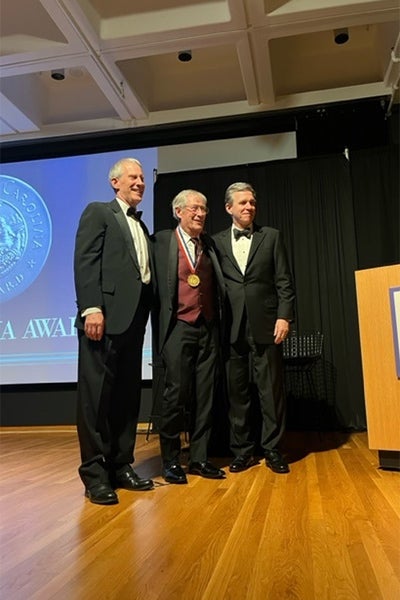ECU professor emeritus receives North Carolina Award
Stanley R. Riggs, East Carolina University professor emeritus and distinguished professor of geological sciences, was one of six individuals presented with the state’s top civilian honor, the North Carolina Award, by Governor Roy Cooper during a Nov. 15 ceremony at the North Carolina Museum of Art in Raleigh.
The award — created by the N.C. General Assembly in 1961 and administered by the N.C. Department of Natural and Cultural Resources annually since 1964 — recognizes significant contributions to the state and nation in the fields of fine art, literature, public service and science. Past recipients include Selma Burke, William Friday, James Taylor, Etta Baker, David Brinkley, Maya Angelou, Billy Graham and Branford Marsalis.

East Carolina University professor emeritus and distinguished professor of geological sciences Stanley Riggs, center, is presented the North Carolina Award by North Carolina Secretary Reid Wilson and Governor Roy Cooper. (Contributed photo)
“I am totally honored and humbled by this lifetime award for supporting an incredibly stimulating and educational career’s worth of work,” Riggs said. “I have dedicated my entire 58-year career to understanding the complexities and history of our world-class natural resource systems and translating that knowledge to the students, citizens and leadership of our great state of the longleaf pine.”
Riggs, who received the award in the category of science, began his work as a marine geologist in the 1960s before many people recognized the importance of climate change research. In 1967, he was one of five scientists ECU recruited to the Thomas Harriot College of Arts and Sciences Department of Geological Sciences for the purpose of kickstarting the university’s new geology and marine science program. He spent the next 33 years at ECU teaching geology and tracking change within North Carolina’s coastal system. Riggs retired from ECU in 1999.
“Stan has had an amazing career, one that shows little sign of slowing down in its quest for knowledge and application of that knowledge for the benefit of humankind,” said Dr. Steven Culver, professor and former chair of ECU’s Department of Geological Sciences, who wrote a letter supporting Riggs’ nomination for the award. “Stan has been the leader, the driving force and, quite unusually for an academic, the communicator of knowledge about our coastal system to the general public, educators, coastal managers and politicians. He is truly a North Carolina treasure.”
“I did not earn this award alone,” Riggs said. “I always worked with great teams of students, colleagues, agencies, organizations and a public that ultimately cares about living gently with the dynamics of change in our watery world of rivers, estuaries, barrier islands and vast coastal ocean. This landscape, waterscape and airspace is our only home. Its natural resources and dynamics drove our cultural history and will dictate the future if we take care of it and each other.”
In recognition of his research and work, in 1983, Riggs received the University of North Carolina Board of Governors’ Oliver Max Gardner Award, presented to a faculty member who has “made the greatest contribution to the welfare of the human race.” In 1986, he received a Queen Elizabeth II Senior Research Fellowship in marine science, an honor awarded by the Australian minister for science. In 1994, he received ECU’s Thomas Harriot College of Arts and Sciences highest honor of distinguished professor, and in 2021, he received the Francis P. Shepard Medal of the Society for Sedimentary Geologists for “a sustained record of outstanding research contributions to marine geology.”
Over the course of his career, Riggs has provided his expertise and service to North Carolina. He served as an advisor on the relocation of the Cape Hatteras lighthouse. He was a member of the N.C. Legislative Commission on Global Climate Change from 2005-10, and most recently, he has been advising the town of Windsor about flood mitigation strategies for the future of climate change.
He also finds time to continue original research. He has published several books on coastal dynamics and climate change, including “Drowning the North Carolina Coast” and “The Battle for North Carolina’s Coast.” Recently, he co-authored a paper with an ECU geology graduate student and six undergraduates, and he has just finished writing a new book.
The five other individuals honored with the 2022 North Carolina Award include the Hon. Eva M. Clayton for public service; Hon. H.M. “Mickey” Michaux Jr. for public service; Eric Church for fine arts; David Zucchino for literature; and Dr. Priya S. Kishnani for science.
“These individuals have enriched North Carolina and our nation through their extraordinary accomplishments,” said Reid Wilson, secretary of the N.C. Department of Natural and Cultural Resources. “Each of them has enhanced the lives of North Carolinians through their lasting achievements in the arts, literature, sciences and public service.”